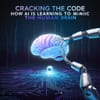Artificial Intelligence (AI) is pushing the boundaries of what technology can do, and now it’s taking on one of the biggest challenges of all: mimicking the human brain. Researchers are making strides in understanding how our brains work and using that knowledge to make AI smarter and more intuitive.
At the heart of this endeavor is the quest to decode the intricate workings of our neural networks. The human brain, with its approximately 86 billion neurons and countless connections, is incredibly complex. Scientists and engineers are trying to replicate this complexity in AI systems to enhance their learning capabilities and decision-making skills.
One exciting development in this field is the creation of neural networks that mirror the brain’s structure. These AI models aim to simulate the way neurons and synapses interact, allowing machines to process information in a manner similar to human cognition. This approach could lead to more advanced AI that understands context, learns from experiences, and adapts more effectively to new situations.
Researchers are also exploring how the brain encodes information and makes decisions. By studying brain activity patterns, they hope to develop algorithms that can replicate these processes in AI. This means future AI systems might not just follow pre-set rules but could actually understand and predict based on past experiences, much like a human would.
The potential benefits of this research are enormous. Imagine AI that can not only respond to commands but also anticipate needs, solve problems creatively, and even display a kind of “intuition.” Such advancements could revolutionize industries ranging from healthcare to finance, making technology more responsive and intelligent.
Of course, there are challenges ahead. Replicating the human brain’s functions is no small feat. The brain’s ability to handle ambiguous information and learn from minimal data is something AI still struggles with. However, each breakthrough brings us closer to creating machines that can think and learn in ways that were previously thought impossible.
As researchers continue to unlock the secrets of the brain, the future of AI looks incredibly promising. With each step forward, we get closer to developing machines that not only mimic human thought processes but also enhance our own capabilities. It’s an exciting time in the world of technology, as we stand on the brink of a new era where AI and human-like intelligence may soon intersect in remarkable ways.


